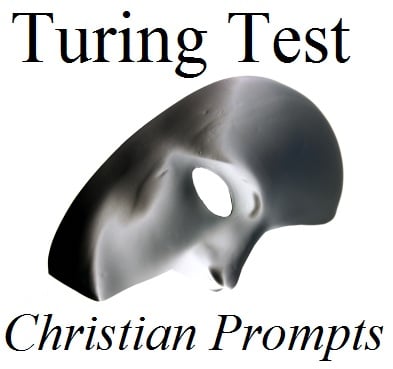This is the sixth entry in the Christian round of the 2013 Ideological Turing Test. This year, atheists and Christians responded to questions about sex, death, and literature.
Polyamory
Marriage, in its essence, is meant to be an image of God’s love for humanity. It is a foretaste of heaven, a way to help us better understand God’s immense love for us, His self-gift to us, and the life-giving nature of that love. The love between God and humanity is total and personal – God does not hold back any bit of Himself in loving us and He loves each of us as a unique individual, not just as part of a vague whole of “humanity.” Our love for Him, while imperfect here, will be total in heaven and will be directed at God in a distinctly personal manner.
In Genesis, we see how God created marriage to reflect the total self-gift that He desires in heaven. Because human beings are finite, we cannot love in the all-encompassing manner that God loves. He established the Sacrament of Marriage, so that by loving one other person completely, we could experience in a finite way His infinite love for us. Part of the nature of God’s love is that it is fruitful – the love that the Father and the Son have for each other eternally generates the Holy Spirit. In the same way, marriage is by its nature fruitful, the love of the husband and wife generating children.
God created marriage in the way – between one man and one woman – because of the totality of the love man and woman must have for each other as well as the fruitfulness of that love. A union of more than two people would not allow for the totality that is present between one man and one woman. A man cannot give himself completely to one woman if he is also giving himself physically, spiritually, and emotionally to another woman – and the same goes if you rearrange any of the gendered words. Without full self-gift, the marriage is not a true marriage.
This is, of course, all dealing with sacramental marriage. Civil marriage is a more difficult question to tackle because in many ways it is the realm of the government. However, from a religious standpoint, civil marriage performs two functions. First, to the extent that civil law reflects morality, it reflects what true (i.e. sacramental marriage) is. The extent of this role of civil law is the subject of robust debate among moral theologians. Second, civil marriage is fundamental to society because it provides the structure for the raising of children and the passing of property. Polyamory would complicate these systems.
Obviously, these views do depend upon a particular understand of God. It is possible to reach a philosophical understanding of love that would lead to similar, if not quite the same, conclusions. That would take much more that 1,000 words, however, and I would refer any curious philosophers to Karol Wotyła’s Love and Responsibility.
Euthanasia
It is never permissible (and thus never obligatory) to end a life — in the case of euthanasia, as posed here; the question of capital punishment might also answer the question as worded, but not in this context. Deliberately ending an innocent (i.e. not a true aggressor) human life is morally murder, which is always impermissible. Human life has an intrinsic value; while it is not the only or the ultimate value, it has an unquantifiable value. From a philosophical standpoint, this statement is axiomatic, but from a theological standpoint, it goes back to divine authority.
Human beings are created in the image and likeness of God; given their very being as gift from God; and redeemed by His Son at great price. For all of these reasons, human beings have intrinsic value. Any form of euthanasia is a form of murder.
There is a difference between euthanasia and not administering certain treatment to prolong life. In moral theology, the two are broken down based on the “moral object.” The “moral object” is used to define what is being done. It is identified by looking at the natural end of the physical action along with the moral quality of said action. A classic example to help clarify what is meant by moral object is sexual intercourse. The moral object of sexual intercourse between two persons married to each other is marital intercourse. The same physical act, between two persons married but not to each other, is adultery. The two instances have different moral objects, the former being sometimes permissible (I’m sure we can all think of moments when spouses should not be having sexual intercourse) latter being always morally impermissible.
In the case of euthanasia, as state above, the moral object is murder – the deliberate killing of an innocent person. The case of not administering life-prolonging treatment is much more tricky. The action itself (not giving medical treatment) is morally neutral, but the circumstances and intentions surrounding the act can change that. To start with the obvious, if the point of withholding the treatment is to cause death, then this act is murder and it is morally impermissible. However, sometimes the purpose of withholding treatment is more complicated.
The benefits of treatment – prolonging life – are weighed against the burdens of treatment – pain, financial burden, mental incapacity, etc. In this case, if the burdens, under careful consideration, outweigh the benefits, it can be morally permissible to stop the treatment. It is very important to note that never can “longer life” be considered as a burden of the treatment. It might seem contrary to Christian values to weigh benefits versus burdens, but this is actually in keeping with Christian moral theology. The key to keep in mind is that certain actions are intrinsically wrong, and no amount of proportionality can justify them. It is when weighing between two actions that not intrinsically wrong, with actors who have good motives that a level of proportionality can come into play. This sort of reasoning can determine when it is and is not permissible to withhold medical treatment.
You can vote on whether you think these answers were written by a Christian or an Atheist here. Comments are open to discuss the substance of the post and for speculation about the true beliefs of the author, so please vote before looking at the comments.












